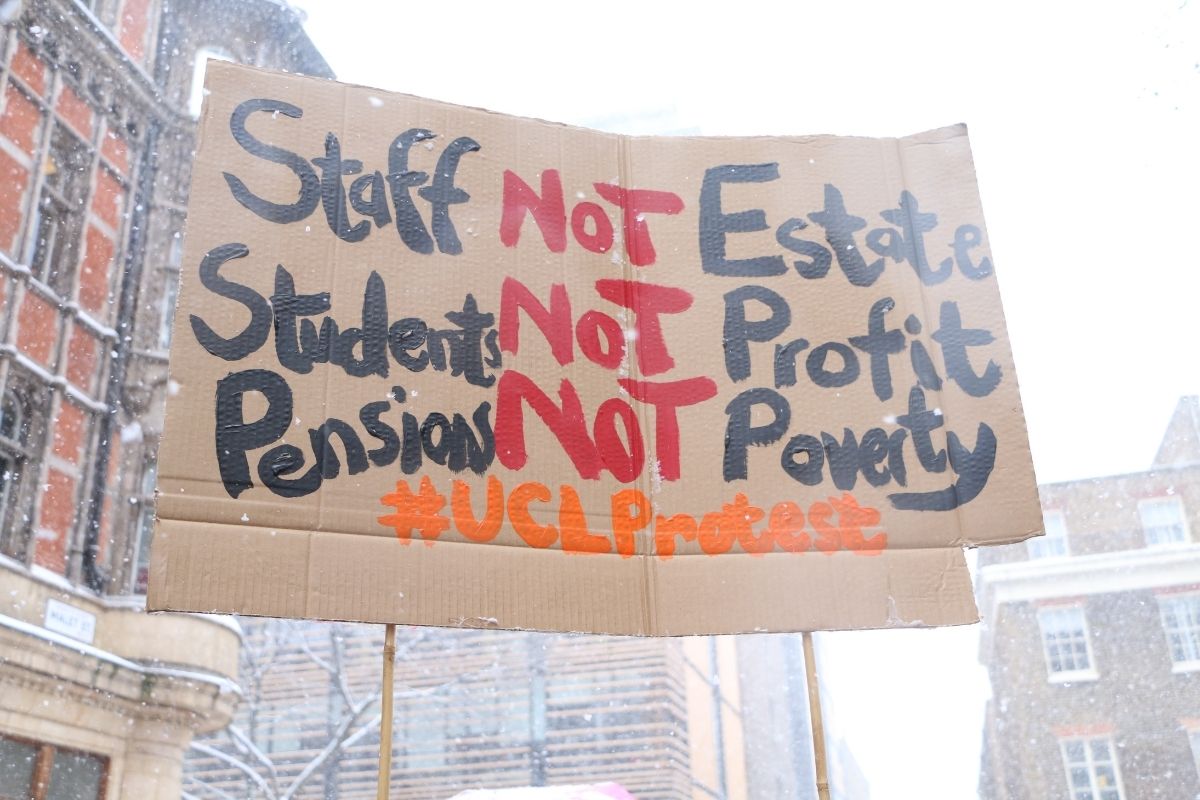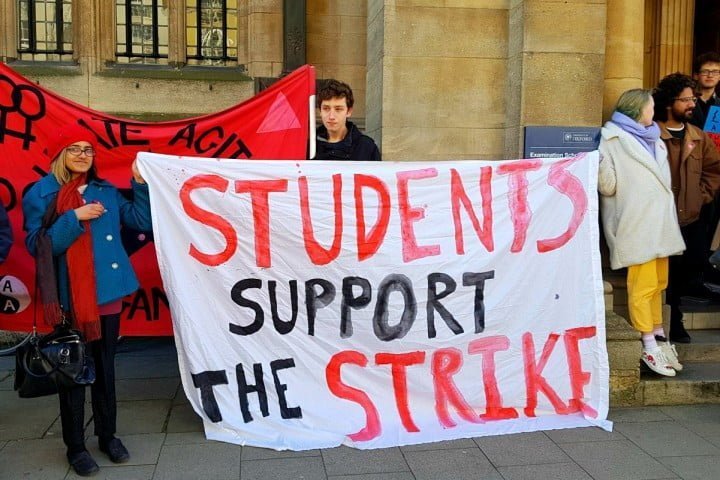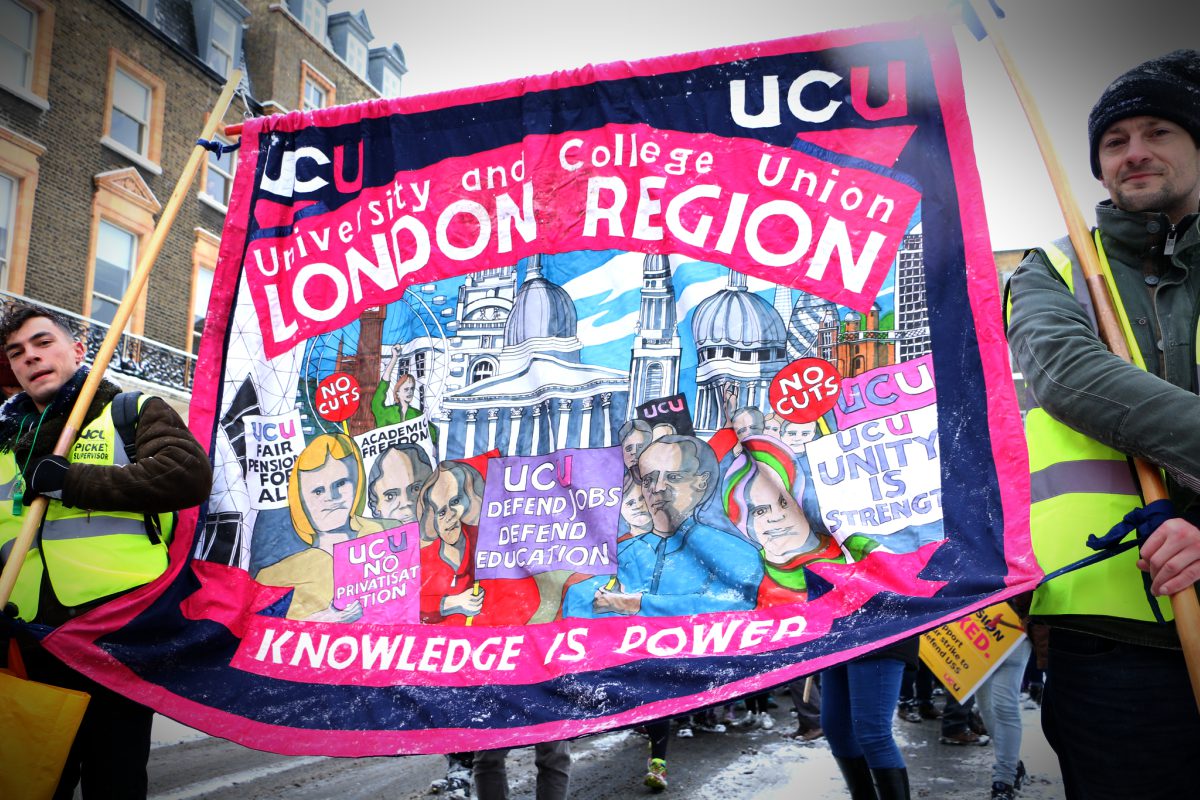Following three days of industrial action in December, further strikes by UCU members in UK universities are on the cards this term. To win, the union must prepare members for all-out action, and unite with workers and students across education.
Following branch delegate meetings and a meeting of the Higher Education Committee (HEC) last week, the UCU (University and College Union) are set for another round of strike action in February, should no progress be made in the long-standing disputes over pensions, pay, and working conditions.
While further strike action is very welcome, UCU Marxists repeat our call for the union’s leadership to mobilise boldly for escalation to indefinite strike action, if the employers continue to dismiss members’ demands. This is the only way to galvanise members to win both disputes.
Reballots

Last December, before the winter break, thousands of UCU members took three days of symbolic strike action in defence of pensions and for better pay and working conditions. This action showed some of UCU’s potential strength – but it was clearly not the end of the struggle.
Since then, 42 universities have been reballoted in an effort to broaden the scale of the industrial action. For the most part, UCU branches where the initial vote failed to beat the anti-union turnout threshold of 50% were smaller and less active. These weaknesses continued to affect the reballots, with only 12 further universities joining the mandate for industrial action.
Given that reballots also coincided with the festive holidays, however, these results still indicate a broadening of support for industrial action. What’s more, in branches that failed to make the turnout threshold, there have been large majorities in support of industrial action, demonstrating the strong level of support amongst active UCU members for continuing their fight.
As a result, 68 out of 145 branches are now in a position to participate in industrial action. Given the size of these branches, the proportion of members who are in a position to participate is even higher than this figure indicates.
If this strength is not to be wasted, however, the leadership of UCU will have to articulate a clear, convincing strategy for winning these disputes, in order to energise the membership. In our view, this means a militant strategy based on an escalation of the industrial action to an indefinite strike.
Militant strategy
So far, the leadership of UCU is sending out mixed signals on the question of strategy – precisely at a time when clarity is vital.
Senior figures, such as the union’s general secretary, Jo Grady, have been mixing militant rhetoric at meetings and rallies of members with doses of defeatist language.
The union leadership has indicated a lack of faith in winning the Four Fights dispute (over wage levels, workload, casualisation, and pay inequality), for example, arguing that the issues are endemic and cannot be won in a single dispute.
Of course, there is an element of truth to this argument. The market logic that now dominates higher education will inevitably lead employers to cut pay and attack working conditions, in order to extract more value from workers; and this problem can only be resolved by kicking the profit motive out of universities, as part of a socialist transformation of society.
Indeed, in the current epoch of capitalist crisis, as the bosses look to present workers and youth with the bill, this problem will only get worse. A real, lasting solution to the problems facing our education system – which means bringing the economy under the democratic control of the working class – is more desperately needed than ever.
Instead of pessimistically lowering the expectations of workers and resigning the union to long-term defeat, however, the leadership could be pointing to a positive way forward, by articulating demands more concretely and boldly.
Rather than the vague demand for a new settlement on casualisation, for example, the UCU leadership could support the CoronaContract campaign, which demands a minimum contract length of two years.
On the issue of equality, meanwhile, the union could campaign for free childcare provided by employers, and for fairer parental leave.
Concrete demands like these would enthuse members and ensure full participation in industrial action. Combined with a strategy of indefinite action, members could feel confident in what they were fighting for – and confident they are fighting to win.
Decoupling disputes
Unfortunately, reports from the recent meeting of the UCU HEC indicate that significant elements of the union’s leadership are moving away from a militant strategy.
This is in defiance of the views of rank-and-file members: branch delegate meetings were overwhelmingly in favour of escalation and fighting the two disputes (over pensions and the Four Fights) together.
We analysed the google docs written at the @UCU branch delegates meetings: at the meeting on the #fourfights dispute, 81.4% of delegates explicitly expressed support for escalation; 67.1% expressed the view that 4FF and USS disputes should be kept together. #OneOfUSAllOfUs
— King’s College, London, University & College Union (@KCL_UCU) January 21, 2022
Some figures are even preparing to sell out the membership by proposing a strategy of ‘decoupling’ the pensions dispute from the Four Fights.
Were this to be implemented, such a strategy would signify a betrayal – explicitly so, given that UCU congress also voted to keep these two disputes ‘coupled’. Members particularly affected by casualisation and pay inequality – such as young workers and those from oppressed groups – would be left to fend for themselves.
UCU Marxists stand firmly in favour of keeping the issues of pensions, pay, and working conditions firmly tied together. To win this dispute, we need the support of all layers of the union.
In the struggle against the bosses, unity is strength. Decoupling, however, is a recipe for division. And division is the first step to defeat.
Which way forward?

UCU has every reason to go into the next period of industrial action with confidence. But this is only as long as the whole union prepares for sustained action in support of clear and tangible demands that answer the urgent needs of rank-and-file members.
To indicate to employers, members, non-unionised workers, and students that this is not a routine strike, we support the call by the UCU Left for industrial action that is escalated to indefinite, national strike action.
The resources exist at the national level to support workers through a period of sustained industrial action. And the threat of such action would increase pressure on university bosses, who are eager to ensure that students graduate on time in the summer.
We also need to formulate our demands in concrete terms that members (and, again, non-unionised workers) can understand. When we are clear about what we are seeking to achieve, we can inspire more workers to join the struggle and stick with it. This would also mean less wiggle room for employers.
The union also needs to look for support from across the wider labour and student movement. UCU members should work closely with the NUS (National Union of Students) and student activists to build for the national student walkout scheduled for 2 March.
If this student walkout were combined with strike action by HE staff, this would effectively shut down campuses.
And with ongoing disputes in the higher education section of Unison, there is potential for us to work more closely with colleagues in other campus unions to organise coordinated strike action, intensifying the pressure on the employers.
Across Britain, and across the world, the working class is moving into action through its industrial organisations: from Striketober in the USA, to a potential Spring of Discontent in the UK.
UCU can play an important role alongside other left-led unions in this resurgence of the class struggle – but only if it has a convincing strategy for winning.






